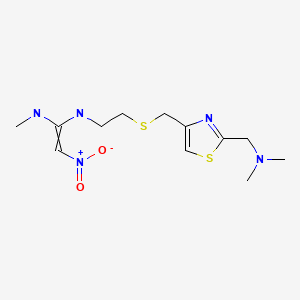CASRN: 76963-41-2

Drug Levels and Effects
Summary of Use during Lactation
Because of the low levels of nizatidine in breastmilk, amounts ingested by the infant are small and would not be expected to cause any adverse effects in breastfed infants. No special precautions are required. Histamine H2-antagonists with more extensive use might be preferred in newborns.
Drug Levels
Maternal Levels. Three women who had been breastfeeding for 3 to 8 months were given nizatidine 150 mg orally every 12 hours for 5 doses. Milk nizatidine was measured at several times after the first and fifth doses. Peak milk levels of about 1.2 mg/L occurred about 2 hours after the dose. The mothers excreted a combined average of 96 mcg (range 55 to 137 mcg) of nizatidine into breast milk over the 12 hours after the first and last doses which was less than 0.1% of the mothers' total dose. The half-life in milk averaged less than 2 hours.[1]
Infant Levels. Relevant published information was not found as of the revision date.
Effects in Breastfed Infants
Relevant published information was not found as of the revision date.
Effects on Lactation and Breastmilk
Histamine H2-receptor blockade is known to stimulate prolactin secretion.[2] No reports of hyperprolactinemia, galactorrhea or effects on breastfeeding women caused by nizatidine were found as of the revision date. The maternal prolactin level in a mother with established lactation may not affect her ability to breastfeed.
Alternate Drugs to Consider
Antacids, Cimetidine, Famotidine, Omeprazole, Pantoprazole, Sucralfate
References
- 1.
- Obermeyer BD, Bergstrom RF, Callaghan JT, et al. Secretion of nizatidine into human breast milk after single and multiple doses. Clin Pharmacol Ther. 1990;47:724–30. [PubMed: 1972674]
- 2.
- Knigge UP. Histaminergic regulation of prolactin secretion. Dan Med Bull. 1990;37:109–24. [PubMed: 2188799]
Substance Identification
Substance Name
Nizatidine
CAS Registry Number
76963-41-2
Drug Class
Breast Feeding
Lactation
Anti-Ulcer Agents
Histamine H2 Antagonists
Gastrointestinal Agents
Disclaimer: Information presented in this database is not meant as a substitute for professional judgment. You should consult your healthcare provider for breastfeeding advice related to your particular situation. The U.S. government does not warrant or assume any liability or responsibility for the accuracy or completeness of the information on this Site.
Publication Details
Publication History
Last Revision: February 15, 2021.
Copyright
Attribution Statement: LactMed is a registered trademark of the U.S. Department of Health and Human Services.
Publisher
National Institute of Child Health and Human Development, Bethesda (MD)
NLM Citation
Drugs and Lactation Database (LactMed®) [Internet]. Bethesda (MD): National Institute of Child Health and Human Development; 2006-. Nizatidine. [Updated 2021 Feb 15].